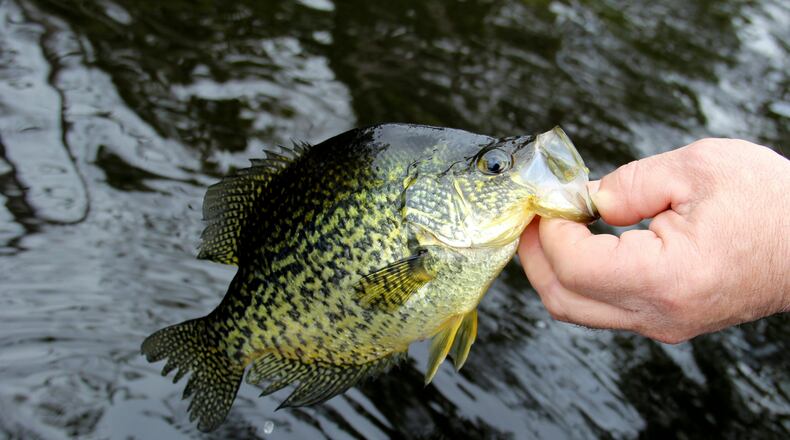After having spent what seemed like a lifetime watching mealworms under bobbers while my dad cast interesting lures and caught bigger fish, I felt like I had graduated to the advanced class.
Crappie started as and still are one of my favorite fish.
Spring is here
Crappie fishing for many is tied to the spring spawn when the fish are in shallower water. The name actually comes from the Canadian French “crapet,” which refers to many different species of the sunfish family. They have a variety of nicknames, including papermouths and specks. To top it off, there are two species, the white and black crappie in Ohio. They often appear in the same water.
The main visual difference isn’t as clear as the name would suggest, but it’s not too difficult to identify them. White crappies will show vertical bars on their sides. Black crappies look more like the scaled inspiration for modern military camo with random black specks.
Home in the trees
Crappies eat a lot and grow relatively fast. That means they need food, and will take bigger prey than you might first guess. They go where the food is, often some kind of structure where baitfish might try to hide. They have a special fondness for sunken timber and any brush found underwater at the proper depth.
The Ohio Department of Natural Resources Division of Wildlife has used that to anglers’ advantage, creating numerous fish attractors at local lakes using old Christmas trees and pallets to create and enhance structure and angling opportunities from shore and by boat.
The location for the fish magnets can be found on the ODNR website, https://gis.ohiodnr.gov/MapViewer/?config=Fishinglakes.
Debra Walters, fish management supervisor for Ohio of Division of Wildlife-District 5, was quick to add that no one should try to create their own attractors on public waters for numerous reasons, most importantly, safety, and that it would be seen as illegal dumping.
If it moves
While they’ll eat about anything, they have a decided preference for minnows and things that look like minnows. Put something that looks like a minnow — curly tail jig, spinner, crankbait or actual minnow — in front of their nose and you’re likely to get a strike.
Where there is one, there is often more. They often move in schools when they’re not tied close to structure. That also means there are as many ways to catch them as you can imagine.
One of the most classic and still productive methods is using a long cane pole and a minnow under a slip bobber. This enables anglers to drop the bait into open pockets in timber. Others find success casting towards objectives, still others troll. It really is up to the angler and conditions.
They grow fast
Somewhere in the middle of the big fish eat little fish order in Ohio, they grow to a “keeper size” quickly. Regulations vary from one body of water to another, but that’s 9 inches this year at Ceasear’s Creek. A recent survey by the ODNR there found that 40% of the fish met that length requirement, with many at or exceeding 12 inches and nudging up to the 13 inches required to qualify for a Fish Ohio Award.
But they can get much bigger. The 29-year-old Ohio record for white crappie was recently broken by Teresa Coy with a 3.91 lbs, 18.5 inch fish. The Ohio black crappie record is 4.5 lbs and has stood since 1981. The all-tackle records for both are in excess of 5 lbs.
While fun to catch, they’re also prized on the table with firm white meat if you choose. They’re aggressiveness, size, and generous harvest limits (again, check your specific regulations) make them ideal for fish fries.
Places to go
Southwest Ohio boasts many good public waters for crappie. For shorebound anglers, Walters suggests Cowan Lake near Wilmington. It has numerous fish attractors, many of which are within casting distance from the bank, but with close access to deep water.
The previously mentioned Caesar’s Creek Lake is a good bet, but can be challenging to fish from the shore. Grand Lake St. Mary’s in the northern part of the district has good numbers and has even hosted several crappie tournaments. That’s just the start of a list of places.
Take a child, or your childlike optimism, and go enjoy some of the best spring fishing Ohio has to offer.
Devin Meister is a local outdoors and wildlife enthusiast and has a blog called “Average Guy Outdoors.” He is an Ohio University graduate. Reach him at meister.devin@gmail.com.
RESOURCES
Ohio Fishing Lakes
https://gis.ohiodnr.gov/MapViewer/?config=Fishinglakes
Fish Ohio Program
https://ohiodnr.gov/buy-and-apply/hunting-fishing-boating/fishing-resources/fishohio-program
About the Author

